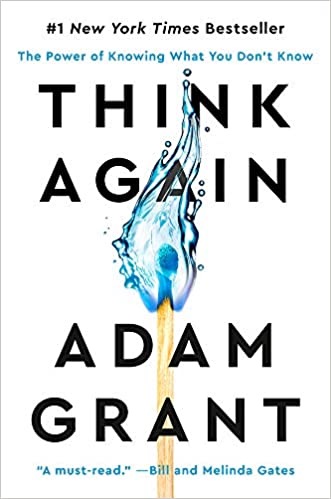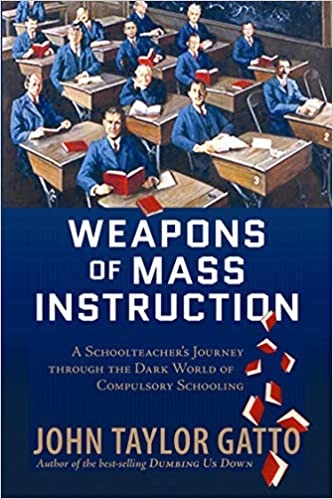
Think Again: The Power of Knowing What You Don’t Know by Adam Grant offers advice about rethinking that all of us can use at work and beyond. The key is to think like a scientist. This means you have to actively try to disprove your own ideas as a way of testing their quality. This would make a great text for any leadership course and an outstanding read for anyone seeking self-improvement. Make sure that there is a copy in your professional development library.
Prologue
- This book is about the value of rethinking your assumptions, instincts, and habits while keeping an open mind. It starts with a story about wildfire fighters who when trapped neglected at first to drop their heavy gear as it was part of their identity and dropping it would signal failure. One man started a fire that in effect burned a hole through the fire and saved his life. This required rapid rethinking as this technique wasn’t taught in fire school. Due to the pandemic, we have also seen many leaders being slow to rethink their assumptions. This book is an invitation to let go of knowledge and opinions that are no longer serving you well. A hallmark of wisdom is knowing when to abandon some of your most treasured tools as you seek new solutions to old problems.
Part I. Individual Rethinking – Updating Our Own Views
1. A Preacher, a Prosecutor, a Politician, and a Scientist Walk into Your Mind
- The big idea here is to think like a scientist rather than a preacher, a prosecutor, or a politician. This requires that you revisit your beliefs to see if new evidence has made them obsolete. The worst bias is thinking that you aren’t biased. Be careful to avoid confirmation bias where you only look for facts that support your beliefs and desirability bias where you see what you want to see. Scientists are actively open-minded searching for reasons why they might be wrong. Your IQ may work against you as smart people recognize patterns faster, which can lead to seeing more stereotypes. If you are trying to promote a change, reinforce the things that will stay the same.
2. The Armchair Quarterback and the Imposter: Finding the Sweet Spot of Confidence
- Here we meet two opposing syndromes. The Armchair Quarterback Syndrome happens when confidence is greater than competence. The Imposter Syndrome happens when competence is greater than confidence. Arrogance is ignorance plus conviction. Humility allows you to absorb life’s experiences and convert them into knowledge and wisdom. A mix of confidence and humility gives us enough doubt to reexamine our old knowledge and confidence to pursue new insights. Most effective leaders score high in both confidence and humility.
- Adam believes that there are benefits associated with the Imposter Syndrome. It can motivate you to work harder. It can allow you to work smarter as you question old assumptions. Finally, it can make you a better learner as you realize that you might have something you need to learn. You are more likely to seek other opinions. It can keep you on your toes as you never think you know it all. You maintain doubts as you know you are partially blind and committed to improving your sight. Each answer raises new questions and your quest for knowledge is never finished. Arrogance, however, leaves you blind to your weaknesses.
3. The Joy of Being Wrong: THe Thrill of Not Believing Everything You Think
- Most of us are wrong more often than we like to admit. Rather than being upset when you find that you are wrong about something, it’s better to tell yourself that it means you are now less wrong than before. You can even be joyful if you realize that it means you have learned something. Adam recommends that you allow learning from being wrong to let you detach from your past and to also live so that your opinions are detached from your identity. This will make it easier when a core belief is challenged.
- A study of professional forecasters showed that the most important driver of success was how often they updated their beliefs. The best went through more rethinking cycles. They have the confident humility to doubt their judgment and the curiosity to discover new information and rethink their predictions. You should view your opinions as hunches and know that something isn’t true just because you believe it. Emotions can also get in the way. When you feel strongly about something you are less likely to change your mind when new facts present themselves. This is why so many respected predictors failed to predict Trump’s victory in 2016.
4. The Good Fight Club: The Psychology of Constructive Conflict
- There are two kinds of conflicts. There are relationship conflicts where people essentially don’t like each other, and there are task conflicts where people disagree about how to do something. The former get in the way of success, while the latter usually helps people to work together successfully. Task conflict brings out the diversity of thought. It can help us stay humble, surface doubts, and make us curious about what we might be missing. It can lead us to think again moving us closer to the truth without damaging our relationships. What matters to children is not how little their parents argue, but how respectfully they argue.
- It’s possible to disagree without being disagreeable. Disagreement is key when it comes to task conflict. The trick is not let task conflict turn into relationship conflict. As a leader, you want to promote the idea that disagreement is necessary for growth and success. It’s also key that leaders show they believe and care about the people with who they disagree. This can make disagreement seem like a sign of respect. Try to frame disputes as debates. This signals that you are receptive to considering dissenting opinions and changing your mind. Don’t fall into the trap that some leaders fall into by surrounding yourself with agreeable people. They shield themselves from task conflict by eliminating boat-rockers and listening to boot-lickers.









